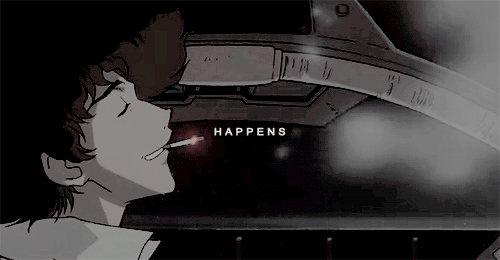Photo

- لا تُغرِب أحداً رآك وطناً
Do not deny someone who sees you home
3K notes
·
View notes
Quote
Inside of me there is a balcony that no one passes in front of for me to greet
في داخلي شرفة لا يمر بها أحد للتحية
Mahmoud Darwish (via nizariat)
1K notes
·
View notes
Quote
Anyone destined to be a philosopher feels within himself a quasi divine love, that is, an impulse not to abandon the rejected and excluded nature in this state of rejection, but to transfigure it again back into the divine and to realign the entire universe in one vast creation of love.
Schelling, Stuttgart Seminars. (via cmbodayle)
154 notes
·
View notes
Text
Liberty, Egalite, Fraternity, ou La Mort!
Young radical, do not grow tired, do not stop the fight! Do not go easy into that good night!
What world is out there without a fight? Without good will; death and fright.
*****
This world around, full of tears, cries in angruish, it is thirsty for a noble voice. A voice to speak of its pain, those who remain silent remain complacent; vanquish your demons and speak the truth! Do not seek pleasure, comfort nor stability. Revolt your masters; do not give in into that good night!
"So you see, the parrhesiastes is someone who takes a risk. Of course, this risk is not always a risk of life. When, for example, you see a friend doing something wrong and you risk incurring his anger by telling him he is wrong, you are acting as a parrhesiastes. In such a case, you do not risk your life, but you may hurt him by your remarks, and your friendship may consequently suffer for it. If, in a political debate, an orator risks losing his popularity because his opinions are contrary to the majority's opinion, or his opinions may usher in a political scandal, he uses parrhesia. Parrhesia, then, is linked to courage in the face of danger: it demands the courage to speak the truth in spite of some danger. And in its extreme form, telling the truth takes place in the "game" of life or death." - Foucault.
The parrhesiastes will redeem humanity.
For what remains in that world to come? That world which is so easy to accept, the weak minded and old at heart love so much. This world; stripped of a soul and all things shining, it speaks but it doesn't feel.
*****
Have the courage to look beyond and peer into that which is concealed. The concealed reveals itself to be the greatest horror. Have we not learned this from history already?
Tarquinius Superbus, the last king of Rome, called for his son to execute dissenter in order to expand the monarchy. How did he communicate this without the messenger knowing of the message? He cut off the head of poppy flowers to symbolize execution.
"What Tarquinius Superbus spoke in his garden with the poppies was understood by his son, but not by the messenger." - Hamann.
*****
Today is no different. The state sends its message through poppies, through flowers, they are colorful and bright. Do we understand the message? Not until we can no longer bear its weight. The concealed reveals itself to be the essential.
How obvious is it that any ruler must legitimize their control through consistent violence?
If you have any courage or dignity left in you, you must affirm these truths. A spark of humanity haunts us, a spark which is no longer fashionable to speak of, ignite this spark or remain in the world of the dead.
1 note
·
View note
Text
Eternal Recurrence
The time which one no longer acts,
in which change no longer subsists,
in which transience is left at a standstill;
the time of no time…
This time, a dreadful time, don’t we all fear it?
This time, a persisting one, interrupting, seizes ones experience…
The Time of The Dead, they call it.
How do we treat the dead,
do we envy them?
Where have they gone?
Or perhaps we must think the most frightening thought of all,
are We the Dead?
Stuck in action, yet motionless.
Authentic, but somehow a quotation.
3 notes
·
View notes
Text
"... the village in a Talmudic legend told by a rabbi in answer to the question why Jews prepare a festive evening meal on Fridays. The legend is about a princess languishing in exile, in a village whose language she does not understand, far from her compatriots. One day this princess receives a letter saying that her fiance has not forgotten her and is on his way to her. The fiance, so says the rabbi, is the Messiah; the princess is the soul; the village in which she lives in exile is the body. She prepares a meal for him because this is the only way in which she can express her joy in a village whose language she does not know. This village of the Talmud is right in Kafka's world. For just as K. lives in the village on Castle Hill, modern man lives in his body; the body slips away from him, is hostile toward him. It may happen that a man wakes up one day and finds himself transformed into vermin. Exile-his exile-has gained control over him. The air of this village blows about Kafka, and that is why he was not tempted to found a religion. ... The air in this village is not free of all the abortive and overripe elements that form such a putrid mixture. This is the air that Kafka had to breathe all his life. He was neither mantic nor the rounder of a religion. How was he able to survive in this air?"
Walter Benjamin; Franz Kafka.
1 note
·
View note
Text
I’m on WordPress!! :)
https://eideticfracture.wordpress.com/
1 note
·
View note
Quote
The living being had no need of eyes when there was nothing remaining outside him to be seen; nor of ears when there was nothing to be heard; and there was no surrounding atmosphere to be breathed; nor would there have been any use of organs by the help of which he might receive his food or get rid of what he had already digested, since there was nothing which went from him or came into him: for there was nothing beside him.
Of design he was created thus, his own waste providing his own food, and all that he did or suffered taking place in and by himself.
For the Creator conceived that a being which was self-sufficient would be far more excellent than one which lacked anything; and, as he had no need to take anything or defend himself against any one, the Creator did not think it necessary to bestow upon him hands: nor had he any need of feet, nor of the whole apparatus of walking; but the movement suited to his spherical form was assigned to him, being of all the seven that which is most appropriate to mind and intelligence; and he was made to move in the same manner and on the same spot, within his own limits revolving in a circle.
All the other six motions were taken away from him, and he was made not to partake of their deviations. And as this circular movement required no feet, the universe was created without legs and without feet
Plato - The Timaeus
1 note
·
View note
Text
When mulanahh writes another fire poem 🔥🔥 goals
You know these feelings, don't you?
When you look for a song, but can’t find cause you do not know how you feel..
When you want to cry and there is no any reason..
When something inside hurts but there is no anything to worry about..
When you do not want to wake up at the morning but you still do at 7 without any reason..
When you look at the mirror and realize you want to change everything..
When you write something like this, but if anyone asks how you feel, your answer will make them believe that you wrote this without any reason..
When you are not who you really want to be..
You like yourself, but still there is something that makes you feel these all.. Sometimes!
___________
Reblog and add what you feel AT THAT MOMENT.. Or just add some ‘whens’!
47 notes
·
View notes
Text
Catharsis
A great comedy besieged me
The greatest comedy of all
In my desperation, my utter anxiety, my melancholy
A great comedy besieged me
Me, a laughing stock, a painful embarrassment
Me, who is so limited, so tiresome in longing for the most profound mystery
The greatest mystery, always in reach, but never grasped
The greatest joke, alast!
The comic; God himself
What humor does he deliver!
My father! Thou hast revealed thyself to me
My lord, the great comic, I beg you, tell them your joke, your children are eager to hear it!
1 note
·
View note
Text
A Survey of the One
Thou remains under apparent change Thee underlies all beings What art thou? In what manner shall thou be grasped? A full body, without any limbs, ears, eyes, nor senses A full body, but yet transcendent Where art thou? Not in the sky, power, nor in perfection Thou art to be found in That Thou art That How can I address it? For I am a simple ego, a thing, and nothing more. Thou escapith my grasp, thou art Other. How can I grasp the Other? How can I escape myself? By annihilation, I must learn from the tragic hero. Alast, Antigone, how much wisdom thy possessed! Through annihilation one proceeds towards the ineffable.
2 notes
·
View notes
Text
The Good and the Monad
I’ve been reading G E Moores Principia Ethica, which at first I thought was just a dumb analytic trying to get all smug about ethics (it actually is that, but there is more), then on closer inspection I realized the guy was making some pretty substantial points.
First off, he articulates the notion of an “unanalyzable-concept”, this concept has meaning in relation to other concepts (being-for-another) but it cannot be understood on its own (being-in-itself).
To illustrate this, he gives the example of “yellow”, there can be a yellow orange, we can understand yellow in relation to the orange, but what is yellow-in-itself? How can we define “yellow”?? To him, we reached an unanalyzable concept.
Now I’m not sure if he gave a method to determine which object is analyzable and which one is complex, I suppose it is somewhat implicit, but basically it is a concept which does not posses attributes, it is a complete unity (sounding more theological than you’d expect).
His thesis is that Good is an unalyzavle object.
Now this is not to say that we cannot talk about good, “this food is good”, makes perfect sense, “the orange is yellow”, sure. But what IS Good?
There have been a number of answers throughout history, I wish to illustrate some.
Aristotle: the Good is that which all beings strive towards.
Here we have another confusion, there is no understanding of good, but only of an adjective, good is still left unanalyzed.
Hedonists: the good is pleasure.
Now, is pleasure the good? Does one mean the other? There is always doubt here.
The problem here lies in taking one object (pleasure) to be something broader (good).
Suppose a utilitarian would come along, how would they argue with each other?
Utilitarian: x is good.
Hedonist: y is good because x is not good.
A similar argument;
P1: a square is a circle.
P2: a square is not a circle because a triangle is a circle.
There is the commitment of the naturalistic fallacy (one which deuntology falls into as well);
“ The naturalistic fallacy is the assumption that because the words ‘good’ and, say, 'pleasant’ necessarily describe the same objects, they must attribute the same quality to them.”
I would put it, that it is the misunderstanding of something absolute to be a finite object.
A similar issue would be with god (of course theologically God and the Good are closely intertwined).
The theological point here, I think, is that of the neo-Platonists, Good is not something “natural”, it is not something in the world, it is beyond such categories, wholly transcendent, just like “the One”(/God).
This was the most striking aspect of his analysis to me, not the ethics or what have you. What’s interesting here is, we have a concept that, the more it is explicated about, the more predicates or attributes it is given, the more we do not understand it, for it is a simple unity, not a complex whole.
This too is the notion of God in various traditions (particularly this has been elaborated on in Islamic and Jewish theology of the 10th century, and has been developed by many others ever since), the notion of God is something that is precisely not a thing that could be understood in a naturalistic sense, therefore god cannot be “spoken” about (negative theology), god cannot be given attributes in himself.
Moore goes further than this, not only are Good and God unanalyzable, but he has no problem to say that these unanalyzable objects are at the very core of any definition, it is the atomic unit. The atomic word which lies at the essence of a thing must be the in-itself.
It is a Monad.
To go beyond Moore, lets use this same logic to understand the most basic questions of philosophy, the ones which have launched its starting point, Socrates comes to mind.
He asks the same question, “what is Justice?”, “what is the Good?”, in doing so, he is questioning the very implicit nature of reality in attempt to divorce it of its being and will therefore lead to an eternal regress or exponential growth.
For information grows exponentially, from One we get, from two, three, from three, a myriad of things.
It multiplies and generates, by having to define “justice”, he must define “is”, etc etc. every part implies the whole, and the whole is in essence unalyzable to its atomistic units. Leaving reality in some sense open, the elaboration of all reality leading into an, unending-end, not a composite object, in-itself, being unalyzable.
1 note
·
View note
Text
First Cause
So, we've all heard the argument from first cause. Typically it goes something like this, "x causes y, y causes z, ad infinitum". The objection now is "what causes x?" to which one can either answer "x causes itself, it is God" or "x was caused by another force we don't know of, presumably matter". Both conclusions don't escape the problem. Simply giving x a new name, or stating that there is no paradox does not give an answer! So, we must rethink this issue. We must ask, can God be equated to x? The answer is demonstrably, no! God, whatever it may be, is immaterial, if we hold that God had a causal connection with matter, then we hold God to be another object in the chain of objects, the only special attribute (which is not in the essence of the object but only in its relation) is that it is first. So, if God is not an object in causality, how can it cause? I remember as a child, my father used to say, "God is prior to all, he is not a body and he does not have a body". Working with this definition, God is immaterial (has no body, as we already concluded) and he is also prior to causality itself. We might think of a person, a person is rational, that is what causes it to be a person and not an animal, it is also living, but even before it living it must exist. Existence is prior to all causal relations of the subject, being is primordial. You can apply this to all things, for a thing to exist it must first "be", a subject which predicates (being, predicating living, predicating rationality, which then contains man). Now, we might want to go even further, and abstract this principle of being to be something that is present in all things, and therefore also the cause of all things, a complete, simple, unity. "Nothing to something." We might call this, Being, substance, nothing, tao or God, all which hold the same meaning. For those of you who are familiar with the history of philosophy, this might sound similar to neo platonism, or Islamic theology, indeed this is not from my own intellect but it has been acquired from authors from these movements. Particularly, al-Kindi. This is not a belief I hold dear, merely a thought I found interesting.
4 notes
·
View notes
Text
A Pen
Me: what is this? How do I use the pen?
Mother: you must learn to apply it, you must learn the rules of conduct. First, you must think to yourself, “in an ideal situation, how would I apply the pen?” then, you observe the situation you are in and apply it correctly. Well, indeed, in an ideal situation, what would be done? One must surely not rage with the pen, for writing is no simple task. One must be attentive with the pen, we must be attentive to use the pen correctly, surely. I bet you agree that we must also deal with the pen in hindsight, for we cannot start writing what we do not know. So, hindsight and attentiveness are how you must use the pen, APPLY THESE VIRTUES TO UNLOCK THE MYSTERY YOU SEEK.
Me: it’s ok mother *I laughed* I haven’t learned a thing, but look at my drawing *I showed my drawing to my mother * .
Mother: YOU DISRUPT MY CIRCLE, I TELL YOU TRUTH AND YOU GIVE ME METHOD, YOU DISRUPT MY FUNCTIONALITY!! WHAT BANALITY IS THIS!? YOU DISRUPT THE HARMONY!!!
Me: mother, you must know, there is nothing but banality. You must learn to accept this, there is never harmony, never an end. Furthermore, in your lecture you gave, you have forgotten an integral part of the pen, the will. The action. We must act, don’t you agree? The action is all that is, you are spinning in circles, you must realize there is an elusive truth to the world which is ungraspable. To learn that, you must draw.
4 notes
·
View notes
Photo
How I love this man!!!

“In Rimbaud’s poetry we find the strange expression: ‘logical revolts’. This is probably a good definition of the philosophical act.” –Alain Badiou, Philosophy for Militants
293 notes
·
View notes




